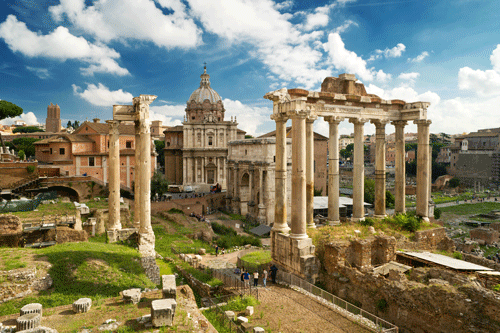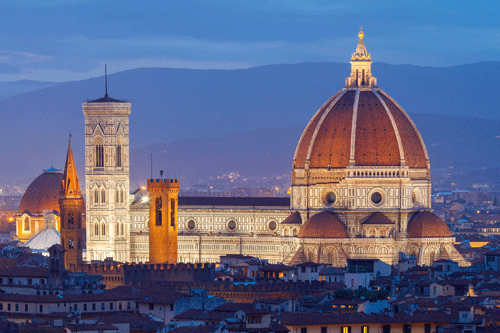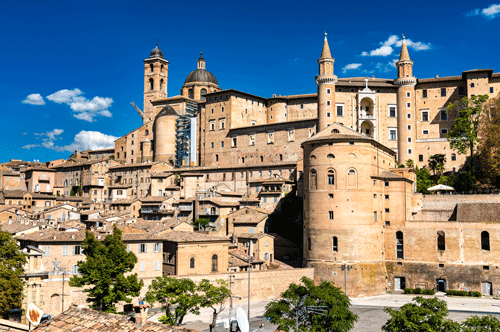Italy, with its variety of landscapes from majestic mountains to lively seaside resorts, from tranquil lakes to wild forests, from hidden hamlets to world-renowned art-filled cities matched with unrivalled hospitality, is the ultimate destination for discerning travellers.
The Italian National Tourist Board in London looks after the promotion of tourism to Italy for the UK and Ireland. Great Britain is one of the main tourism markets for the country and Britons have had a long love affair with Italy since the days of the Grand Tour.
Can British travellers visit Italy?
Italy accepts the UK’s vaccination record and proof of recovery as an equivalent to its green pass and recently-introduced “super green pass”.
Visitors who are fully vaccinated can enter the country without needing to self-isolate, but must fill out a passenger locator form and present a Covid-19 green pass on arrival, which certifies the person has been fully vaccinated at least 14 days prior to their visit with a vaccine recognised by the European Medicines Agency. Travellers must also show proof of a negative PCR test, taken within 48 hours of entering Italy, or a negative antigen test, taken within 24 hours of entering Italy.
Those who are not fully vaccinated must fill out a passenger locator form and show proof of a negative PCR test taken no more than 48 hours before entering Italy, or a negative antigen test, taken within 24 hours of entering Italy. They must also notify the prevention department of the local health authority of their entry into Italy, travel to their final destination by private vehicle, and remain in self-isolation for five days. They then need to take another PCR or antigen test at the end of the five-day period.
Children aged five and under do not need to present proof of a negative Covid-19 result on entry into Italy, but must comply with the obligation to isolate when required. Those between six and 18 are exempt from isolation (where applicable) if they are accompanied by an adult (parent or other companion) in possession of a Covid-19 green certificate and present proof of a negative test.
 For more information on the travel measures to enter Italy, click here.
For more information on the travel measures to enter Italy, click here.
As of January 9, fully vaccinated travellers returning to the UK must take a Covid-19 test, which can be a lateral flow test, on or before day two, and fill out a passenger locator form.
Travellers returning to the UK who aren’t fully vaccinated must fill out a passenger locator form and take a Covid-19 test before arriving, as well as PCR tests on day two and day eight, and quarantine for 10 days.
What safety measures can visitors expect in Italy?
In Italy, the Covid-19 green certificate facilitates entry at certain public events, such as trade fairs, concerts, sports competitions, parties following religious or civil ceremonies, and access to medical facilities for the elderly.
As of January 10, a “super green pass” is required in order to access many venues and modes of transport, including ski lifts, hotels and restaurants. A negative Covid-19 test is no longer sufficient in these circumstances. The NHS Covid Pass can be used as a “super green pass”.
Each region in Italy is now classified, and all regions are currently white or yellow.
People over the age of 12 must present a Covid-19 digital green pass in order to access certain services and activities, including:
- Travelling by air, train, ship, ferry or bus throughout Italy
- Restaurants, bars, ice cream parlours and cafes for sitting at indoor tables
- Public performances and sporting events, both outdoors and indoors
- Museums, places of culture and shows
- Swimming pools and gyms
- Private parties, such as wedding receptions
- Festivals and trade fairs
- Conventions
- Spas and fitness centres
- Gaming halls, betting shops, bingo halls and casinos
Access to these services and activities is allowed when presenting the EU Digital Covid Certificate or an equivalent certificate issued by the health authorities of Canada, Japan, Israel, the United Kingdom and the United States.
Currently, nightclubs and dance halls are closed until January 31. Parties, concerts and other events where large groups would gather in open spaces are banned.
Can you travel domestically in Italy?
People are now required to show a “super green pass” to travel on public transport, including:
- Domestic flights
- Ships and ferries that connect different regions, with the exception of ferries used to cross the Strait of Messina
- Intercity, Intercity Night and High Speed Trains (Covid-19 green pass is not required to board local trains)
- Coaches and buses connecting different regions
- Coaches and buses used for rental services with driver
Local public transport (bus, metro, tram, etc) is running at 80% capacity. Taxis may not require a green pass.
What are the rules for social distancing and mask wearing in Italy?

It is mandatory to wear face masks outdoors in all parts of Italy. These must be FFP2 face masks and not surgical or cloth masks, and must be worn for any indoor or outdoor activity in Italy. You must also not consume food and drink in public indoor settings. FFP2 masks are also required on public transport.
Children under the age of six, those with disabilities and carers accompanying people with a disability are exempt. There are no restrictions on when people can travel.
Social distancing of at least one metre should be observed, and gatherings avoided.
Bars and restaurants
Bars, pubs, restaurants, ice cream parlours and cafes are open. They must display a sign indicating the maximum number of people allowed inside at the same time.
There is no limit on the number of people who can sit at the same table indoors or outdoors, but everyone needs to show evidence of a “super green pass”.
This rule applies to all regions across Italy.
Beaches
Beach clubs can request a reservation for access to the beach. Body temperature checks are carried out at the entrance. Each umbrella must have a free space of at least 10 square metres around it, while the minimum distance between each deckchair or sun lounger must be at least one and a half metres.
Sports including beach tennis, swimming and surfing are allowed, while respecting distances.
Shops
Shops and shopping centres are open as usual.
Museums and places of culture
Museums and other cultural institutions are open and each of them has different Covid safety measures. Those over the age of 12 must show a “super green pass” to enter.
Cinema, theatres and concerts
It is possible to attend shows in cinemas, theatres, concert halls and outdoor venues, but an FFP2 mask must be worn at all times. Everyone over the age of 12 must show a “super green pass”.
Sport events
Sporting events are open to the public, with a maximum capacity of 50% outdoors and 35% indoors. Those over the age of 12 must show a “super green pass”. It is mandatory to wear an FFP2 mask at all times, and it is forbidden to eat or drink indoors.
Skiing
Ski resorts and lifts are open but “super green passes” are mandatory.

PICTURES: Shutterstock/Catarina Belova, Picturereflex, Viacheslav Lopatin, kavalenkau, Leonid Andronov
Last updated January 11, 2022
